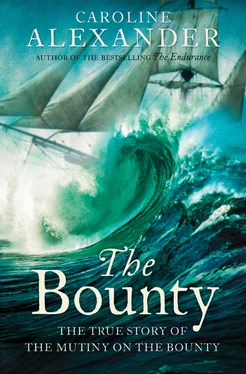The close, occasionally thunderous weather continued and on 8 February, the Bounty crossed the equator. A somewhat modified version of the traditional ceremony for crossing the line was enacted, with the old hands presiding as King Neptune and his court. The twenty-seven officers and men, or over half the ship’s company, who had never crossed before now underwent the rough initiation – covered with tar, ‘shaved’ with the edge of an iron hoop, and compelled to give Neptune gifts of rum. The rum was in lieu of the most fearful part of the usual ceremony – ducking from the yardarm – which Bligh forbade, on the grounds that ‘of all the Customs it is the most brutal and inhuman.’
The day after the ceremony, a Sunday, Bligh ‘mustered the People and saw every thing Clean.’ Divine service was performed, by Bligh, and ‘every person attended with decorum & much decency.’ A few days later, a sail was seen in the early morning; next day they fell in with the British Queen , a whaler bound to the Cape of Good Hope. This fortuitous meeting allowed the Bounty to send letters via the Cape to England. To the Heywoods, Bligh wrote a ‘flattering’ account of young Peter’s progress. To Duncan Campbell, Bligh reported that the passage had been pleasant and that he had acquired some fine wine for Campbell, which he would present on his return.
‘My Men all active good fellows,’ Bligh wrote, ‘& what has given me much pleasure is that I have not yet been obliged to punish any one.’ Food and wine were good: ‘with fine Sour Krout, Pumpkins and dryed Greens and a fresh Meal five times a week I think is no bad living. My Men are not badly off either as they share in all but the Poultry, and with much content & chearfullness, dancing always from 4 untill eight at Night I am happy to hope I shall bring them all home well.’ Once again, Bligh ended with a note about Campbell’s protégé: Tom Ellison is a very good Boy and will do very well.’
To Joseph Banks, Bligh reported nothing but contentment. ‘I am happy and satisfyed in my little ship and we are now fit to go round half a score of worlds,’ he wrote – how different from the fretful, worried letters penned before departure! ‘Both Men & Officers tractable and well disposed & chearfulness & content in the countenance of every one. I am sure nothing is even more conducive to health. I have no cause to inflict punishments for I have no offenders and every thing turns out to my most sanguine expectations.’ This repeated reference to the fact that there had been no need for punishment – flogging – is revealing. It would seem that to Bligh, infliction of punishment was like sickness, and scurvy, something that had no place on a well-run ship. William Bligh had set out to make the perfect voyage.
To Banks, as to Campbell, Bligh concluded with an update on the progress of a protégé. ‘Young Hallet is very well and is a very fine young man,’ he informed Banks, ‘and I shall always attend to every thing that can be of service to him.’
Parting company with the British Queen , the Bounty continued south and days later ‘passed the limits of the Southern Tropic.’ Incrementally, the temperature began to drop. Vast numbers of seabirds were noted – shearwaters, albatross – as well as turtles and numerous whales; one afternoon a cloud of butterflies was blown past the ship. Then, on Sunday, March 2, after divine service and the usual inspection of his men, Bligh made an announcement ‘I now thought it for the Good of the Service to give Mr. Fletcher Christian an Acting Order as Lieut. I therefore Ordered it to be read to all hands.’ This was another clear indication of Bligh’s patronage, if not favouritism, of Christian; a long stint as acting lieutenant would in the normal course of things ensure the master’s mate of promotion on his return.
A week later, out of the blur of notations about butterflies and shearwaters, porpoises and whales, Bligh’s log records an event that returned him squarely to the world of his men: ‘Untill this Afternoon I had hopes I could have performed the Voyage without punishment to any One,’ Bligh wrote, with evident regret, ‘but I found it necessary to punish Mathew Quintal with 2 dozen lashes for Insolence and Contempt.’
In a subsequent published narrative, Bligh expanded on the event. ‘Upon a complaint made to me by the master, I found it necessary to punish Matthew Quintal, one of the seamen, with two dozen lashes, for insolence and mutinous behaviour. Before this, I had not had occasion to punish any person on board.’
Now began the whole grim ritual; the crew mustered to watch Quintal, aged twenty-two, from Cornwall, stripped to the waist and strapped, spread-eagled, by the wrists and ankles to an upright deck grating. With no marines to drum or pipe, this would have been a lacklustre ceremony, itself stripped down to its most pertinent and brutal elements. By all later reports, Quintal, of middle height and ‘strong made’, was a dangerously disaffected troublemaker. It does not appear from the manner in which the incident was logged, however, that Bligh himself had been witness to Quintal’s insubordination; no matter. Once his master logged the event and brought it to Bligh’s attention, Bligh was compelled to administer punishment, and his perfect record was now spoiled.
While the small crew stood formally mustered to witness the punishment in the damp, hazy weather, Boatswain’s Mate James Morrison – the literate diarist, with his smattering of classical education – administered the flogging. For Bligh, whose humane principles had forbidden men’s being ducked when crossing the line, the familiar ritual must have been a singularly unpleasant landmark on his voyage. The natural coarseness of men’s habits – their dirty clothes and fingernails, his surgeon’s ‘beastly’ drunkenness, their cruel and brutal pranks – all offended him. He had chosen a profession infamous for poor conditions and dirty habits, in which men counted on taking brutal poundings from their fellow men and from the sea. Yet Bligh expected his ship to be ‘perfectly sweet’ and scented with vinegar, hardened seamen to wear clean clothes and scrub their hands, cheerfulness to be seen on every countenance and merry dancing in the evening. There was no dirt or disease in Bligh’s vision of the perfect voyage, and no punishment. Busily intent on his many burdensome responsibilities, Bligh was unlikely to have taken note of his men’s practised and scrutinizing gazes. Did they perceive that it was their fastidious, bustling captain who avoided the lash?
The damp, hazy weather closed in and by the following day had become dense fog. The temperature continued to drop, and when the fog cleared the air was felt to be cold. In the afternoon, one of the men shot an albatross that fell dying into the ocean, and a boat was sent out to collect it. On board its wingspan was gravely measured. The superstition that the killing of an albatross brought bad luck was not yet prevalent; Coleridge had not yet written ‘The Rime of the Ancient Mariner’ – this would follow later.
The Bounty was now as far south as the fortieth latitude, the ‘roaring forties’, and was drawing parallel with the coast of Patagonia. A wet, dense fog forbade sight of land, although south of Puerto Deseado the men ‘saw what was supposed to be the looming of it.’ Whales appeared in great numbers and seemed to enjoy lying in groups of two and three windward of the ship, expelling great blasts of spray over the men.
A strong gale arose on 20 March as the Bounty approached the Jasons, the northwesternmost of the Falkland Islands. Albatross, petrels and snowbirds flocked and hovered around the rigging, as if wishing to perch. The wind and sea became violent and Bligh was anxious to get south of the islands; he had by now given up his earlier plan of stopping here for wood and water. The weather was fast deteriorating and he could afford no delays.
Читать дальше












